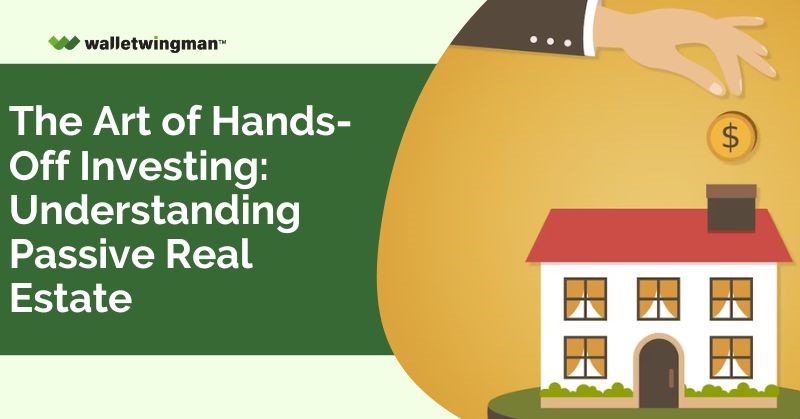Investing in real estate provides numerous benefits. Besides conferring on you the prestigious title of landlord, it also opens up many passive income opportunities. That’s especially true if you’re a commercial real estate investor.
Recent statistics also indicate that the global real estate industry is relatively bullish. The United States real estate market alone is projected to hit USD 113.6 trillion in 2023. So, if there was ever a more opportune time to dip your toes in the property market, it’s got to be now.
You probably already know that passive income through real estate comes primarily from rent payments. However, there are many other ways to cash in on your real estate investment.
This article looks at the top passive real estate income ventures to consider setting up this year.

1. Crowdfunding
Real estate crowdfunding is one of the many passive real estate investing opportunities to pursue. It involves partnering with other investors to pool resources for undertaking a mega real estate project.
The primary benefit of crowdfunding for real estate investors is that it provides the financial muscle to set up a project you wouldn’t otherwise fund alone. Needless to say, the resource-pooling strategy works best when hosted on online community forums or social media platforms.
There are two ways to expend the proceeds realized from real estate crowdfunding.
You might use the funds to finance a property purchase directly if the funds are sizable. Alternatively, you could invest the funds indirectly in mortgage loans. Whichever option you prefer, you’re assured of constant passive real estate cash flow.
2. REITS
Real estate investment trusts (REITs) are real estate firms that operate primarily as trusts. These companies undertake various real estate investments, typically commercial properties, and then pay profits as annual shareholder dividends.
Navigating the operations of REITs can prove a bit challenging for novice real estate investors. Your best bet would be to check out the best books on real estate investing or enroll in a short program on property investment.
But what makes REITs one of the best passive real estate investments is that these companies are not only involved in building or procuring real estate properties. They also offer additional services, such as property maintenance and rent collection. Some REITs even fund mortgages and collect any interest accrued from the properties they’ve invested in.
Of course, the REITs employ qualified staff who take care of all associated maintenance, rent collections, and mortgage funding. Your role is to buy shares in these firms and then passively earn a portion of the profits the properties generate under the company’s ownership.
There are different types of REITs to invest in. Common ones include;
- Equity REITS
Equity REITs own and manage different properties, usually apartment complexes, office buildings, and shopping malls. They make money through rental income and strategic purchases.
- Mortgage REITs
Mortgage REITs borrow money at lower short-term interest rates and then purchase mortgages that attract higher long-term interest rates. They make money by subtracting short-term interests from long-term interests.
- Hybrid REITS
Hybrid REITs are a blend of equity and mortgage REITs. Their diversity makes hybrid REITs an attractive, hands-off real estate investment opportunity.
- Non-traded REITs
Non-traded REITs are another intelligent way to build a massive passive real estate portfolio. These REITs may be registered with the U.S. Securities and Exchange Commission (SEC). But they’re not publicly traded on national security stock exchanges.
Since non-traded REITs don’t typically feature on stock exchanges, you can only establish their market values after investing in them. That flies right in the face of the principle of full disclosure.
- Private REITs
Private REITs are among the riskiest REITs to trade in. That’s because they’re neither SEC-registered nor publicly-traded.
But if properly managed, private REITS can turn out to be among the best paying jobs in real estate investment trusts.

3. Real Estate Funds
Real estate funds are a special type of mutual funds set up to invest in public real estate securities. This investment vehicle can guarantee impressive passive real estate returns if properly executed.
Real estate funds can come in handy when investing in multiple real estate securities. You can even utilize these funds to purchase shares in REITs.
And like REITs, real estate funds are worth pursuing if you’re looking for the best way how to invest in real estate without buying property directly.
However, note that real estate funds are typically a long-term investment vehicle. Profits depend on property value’s appreciation over the years instead of dividends.
4. Vacation Rentals
Vacation rentals are among the best passive real estate options for seasonal real estate investors.
This strategy works best for markets with a substantial transient population, such as areas close to beaches, campsites, and natural wildlife ecosystems.
The main reason to consider vacation rentals is that you can generate considerably more per-night income than you would if renting the property to a long-term tenant. And since you’re hosting short-term tenants, you rarely need to worry about ongoing maintenance.
However, note that there are constant scheduling and housekeeping services. Not to mention low seasons.
5. Leasing Out Unused Land
Buying a piece of land is half the effort. The other half entails developing it into a residential or commercial property, agricultural plantation, etc.
However, there’s no excuse for letting vacant land lie idle when you can lease it out for a fee.
What makes this option one of the top passive real estate opportunities is that you generate income from your piece of land as the property’s value appreciates.
Just remember to establish the type of business the lessee intends to set up in your vacant land and ensure it doesn’t diminish the property’s value.
6. Leasing Storage Facilities
Another popular method to generate passive real estate funds is renting out storage facilities, such as warehouses. The best way to cash in on this passive real estate venture is to pick the right location.
Insist on prime spots, such as those near manufacturing plants or along significant distribution channels.
Be sure to also check the area’s general security situation before setting up your storage facility there. Clients would prefer to keep their merchandise in warehouses that guarantee maximum safety.
Needless to say, the property should be highly affordable and connected to the national electricity grid.

7. Mortgage Brokerage
If you’re looking for hands-off passive real estate strategies that pay huge dividends, you might also consider a career in mortgage brokerage.
A mortgage broker is an intermediary between mortgage lenders and individuals or businesses looking for home loans. To excel in this trade, start by understanding how to become a mortgage broker.
The good news is that you don’t need a college degree to excel in this industry. A high school diploma or GED is a starting point.
After attaining all the relevant academic certifications, the next step is to familiarize yourself with federal laws and regulations regarding real estate properties.
8. Real Estate Brokerage
A mortgage broker is technically a real estate consultant specializing in mortgages and home loans. But this is not the only way to earn passive real estate income through consultancy.
You could also consider becoming a real estate broker. In this case, your duties will link property sellers with potential brokers.
Since you’re keen on making money passively, your best bet is to become a digital real estate agent. This arrangement allows you to discharge most of your consultancy duties online while engaging in other ventures concurrently.
Perhaps your physical presence would be required only during scheduled property inspections.
9. Real Estate Syndication
Real estate syndication provides an ingenious way to own and manage passive real estate assets. This investment strategy involves a group of people who jointly raise capital to finance the purchase or construction of a real estate property.
Real estate syndication is similar to crowdfunding, involving like-minded real estate investors pooling resources for mega projects.
The difference is that most real estate syndications are available only to accredited investors.
The first step in becoming an accredited investor is to have a net worth of at least $1 million, excluding your primary home’s value. Alternatively, your income must be at least $200,000 if unmarried or $300,000 if married.
10. Remote Ownership
Remote ownership is where you invest in passive real estate properties with the help of a property manager. This type of real estate investment is ideal for investors who live out of state or overseas.
As with other passive real estate income streams, you’ll begin by assembling some startup capital. You then decide whether to buy a prebuilt property or construct one from scratch.
Once the property is ready for letting, you assign a property manager who’ll be in charge of its day-to-day maintenance.
You can also invest in remote real estate properties by remitting capital to local real estate agents and having them purchase or construct a property of your choice. This method provides a more hands-off approach as the hired professionals do everything on your behalf.

Wrap Up
There are numerous passive real estate income ideas to explore.
Always work with professionals before investing in the real estate industry as a parting shot. That’s especially true if you’re mulling high-risk ventures like private REITs.
Above all, remember that most real estate investments are long-term. So, don’t expect to recoup your return on investment within a few weeks.


